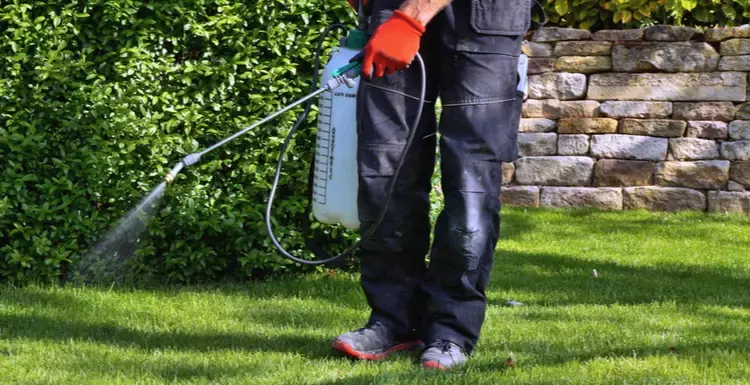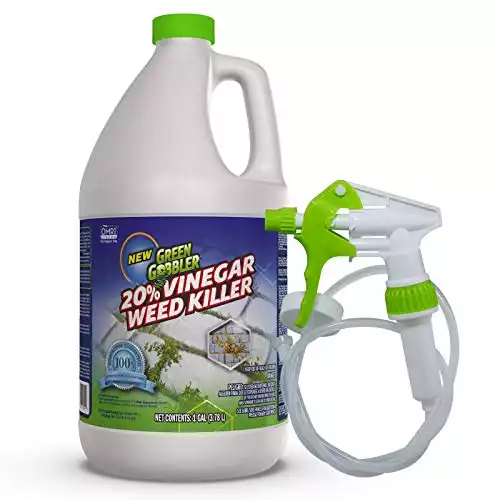If the weeds are taking over, skip the chemicals and mix up a batch of potent homemade weed killer.
You can use simple ingredients that are already in your kitchen! Read on to learn all you need to know.
Why Consider a Homemade Weed Killer?
Whether you’re an avid gardener or a homeowner who just wants a weed-free lawn, the battle against weeds seems never-ending. Store-bought weed killers work, but there are many reasons you may want to skip them.
The best solution? Homemade weed killer made with powerful ingredients that target and destroy weeds while preserving your lawn.
It might sound too good to be true, but with the right ingredients, homemade concoctions completely eliminate weeds. With regular applications, you can prevent them from coming back.
The Benefit to You
These mixtures are easy to make and will be ready for use in a minute or less. They’re made with natural ingredients you probably already have on hand.
It’s more affordable, convenient, and downright satisfying to make your own than to rely on store-bought herbicides. The weeds have gone too far. But they will soon meet their match!
If you’re tired of harboring these unwanted plants in your lawn or flower beds, we’ll show you how to wage war against weeds the natural way. You can make your own weed killer with a variety of ingredients.
Use these homemade herbicides to target specific weeds and keep your lawn and garden healthy. You’ll find a list of ingredients and supplies needed for each mixture. Ready? So are we — let’s get started.
How to Kill Weeds Fast
Weeds steal the nutrients and water from the soil that plants and grass need to thrive. They can ruin the carefully maintained look you want for your garden or lawn.
Homemade mixtures are one great way to give them the boot, but there are a few ways you can go about it. Use one method to get rid of some, or combine methods to give them the old one-two punch.
1. Weed by Hand
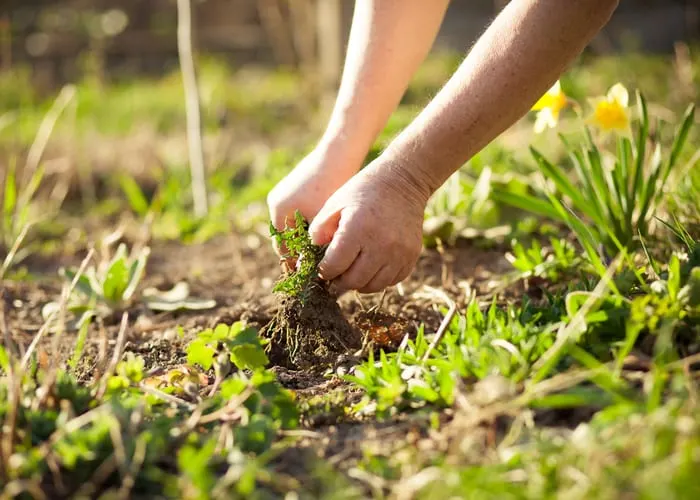
Simon Kadula/Shutterstock
It’s no one’s favorite chore, but weeding by hand is really the best way to get rid of weeds. To remove weeds by hand, just take hold of a weed as close to the root as you can (it helps to loosen the soil first) and firmly but slowly pull it up and out.
A fast yank can break the plant off and make it harder to remove. Make sure you remove every part from the soil so they don’t grow back. For large weeds with robust root systems, pulling by hand can break the greenery off from the roots.
And if the roots stay in the ground, the weed will grow back. In this case, you should use a small garden shovel to dig down to the roots and lift the whole thing out.
If there are just too many weeds to pull them all by hand, try using a homemade herbicide (find easy instructions below) first.
Allow it a little time to start working and weaken the enemy, then come through and remove the dying weeds at the root. It’s up to you if you want to laugh maniacally as you do this.
2. Grab Your Garden Tools
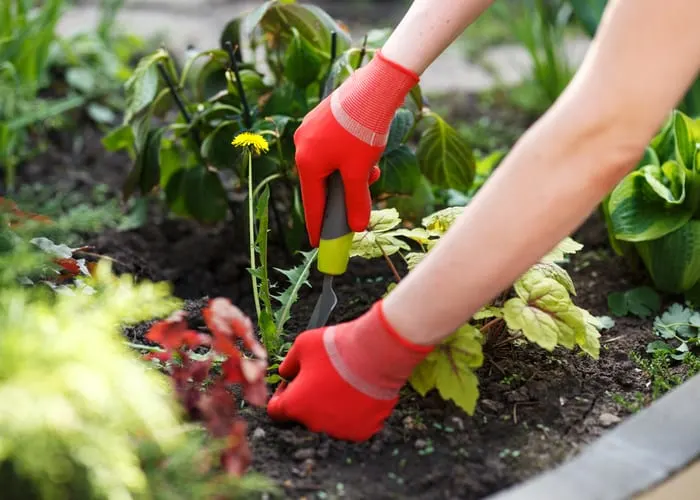
Kostenko Maxim/Shutterstock
Garden tools make weed removal easier, but they still require some effort. There are specialized weed removal tools available, like the Fiskars weeder that grabs weeds’ roots below the surface and allows you to pull the whole thing out in one motion.
But there’s nothing wrong with using the classics:
- A garden hoe or sharp spade is great to chop at weeds and their root systems. This will kill weeds, but make sure other plants’ roots don’t accidentally get chopped in the process.
- A claw rake or cultivator works well to loosen shallow roots of weeds like chickweed or crabgrass.
- A gardening trowel or shovel can be used to dig down to weed roots so you can lift the entire thing out and dispose of it.
3. Spray Them With Weed Killer
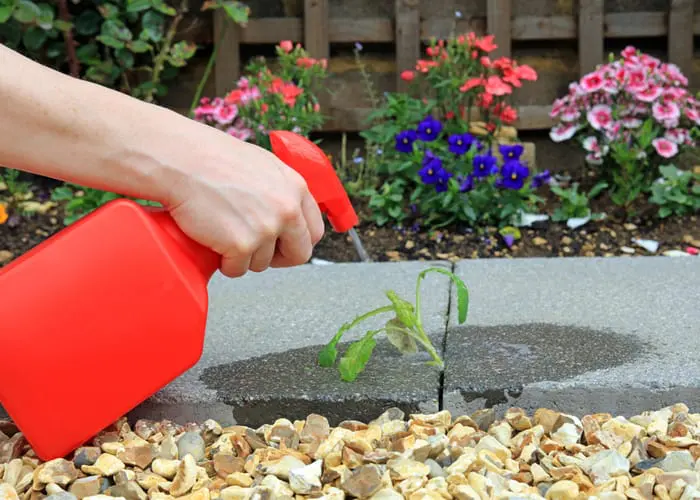
Dean Clarke/Shutterstock
If you’d like to get rid of these plant pests with less effort than weeding by hand or using garden tools, sprayable weed killers are a great solution.
There are several varieties on the market, like the well-known roundup, but many gardeners and homeowners don’t like using them.
Studies have shown many of these products to be correlated to different cancers and adverse environmental effects. Making your own 100% safe solution to kill weeds is a great alternative.
Several homemade weed killing sprays work well, take effect quickly, and are very affordable. In the next section, we’ll share a few “recipes” for the most effective weed-killing mixtures you can use in your garden or lawn.
7 Ways to Make Potent Homemade Weed Killer
1. Vinegar
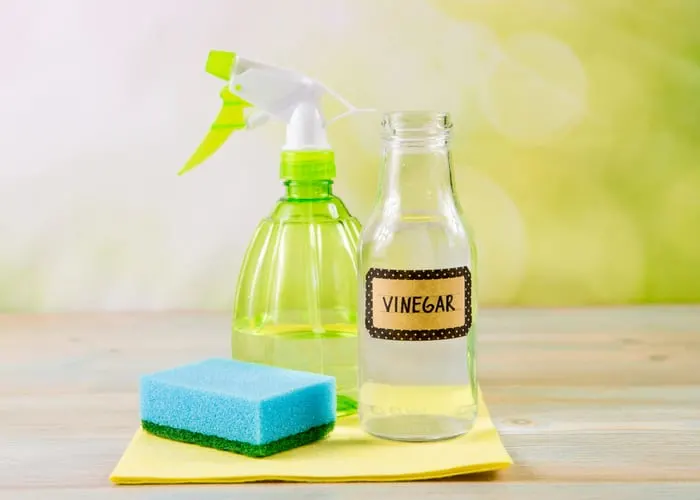
FotoHelin/Shutterstock
Vinegar with the right acidity level is effective in killing the parts of weeds above the soil. If you’re okay with re-applying this mixture once every two weeks or so, it can be a great solution for unsightly weeds.
In grocery stores, you’ll usually find vinegar with a maximum of 5% acetic acid. This means only 5% of the contents are actually vinegar and the rest is water used to dilute the vinegar.
Look for horticultural vinegar instead, which can have an acetic acid content of up to 20%.
- Heavy-duty spray bottle
- Funnel
- Enough 5%, 10%, or 20% acetic acid vinegar to fill the spray bottle
Add the vinegar to the spray bottle using the funnel. Thoroughly spray the leaves and stems of any weeds you want to kill. Remember, vinegar alone will not penetrate the soil enough to kill the roots of weeds.
Use it to kill the green growth above ground, but if you want to kill the weeds at the roots, scroll down to the mixtures containing salt. This mixture won’t harm the soil, so you’re free to replant in the sprayed area after the weeds are dead.
2. Vinegar and Dish Soap
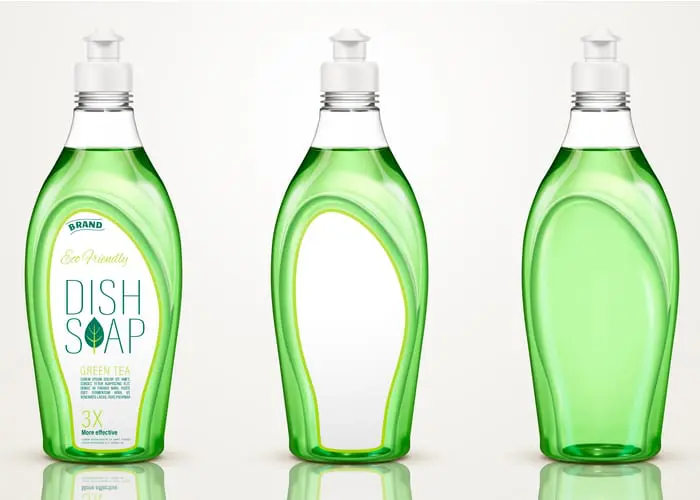
MITstudio/Shutterstock
Combining vinegar and dish soap makes the acetic acid in vinegar even more effective. The dish soap helps by breaking the vinegar’s surface tension and helping it stick to the leaves of sprayed weeds.
Essentially, by adding dish soap to the party, you make the vinegar stick to the weeds longer and do more damage.
- Heavy-duty spray bottle
- Enough 5%, 10%, or 20% acetic acid vinegar to fill the spray bottle
- One teaspoon dish soap
Use the funnel to add vinegar to the spray bottle. Add the teaspoon of dish soap and shake or swirl the mixture around to combine. Spray on weeds to kill the growth above ground.
This mixture will be broken down naturally by the time it’s absorbed into the soil, so it is safe to use in areas where you want to replant. But it will kill other plants it touches, so spray carefully.
3. Salt and Water
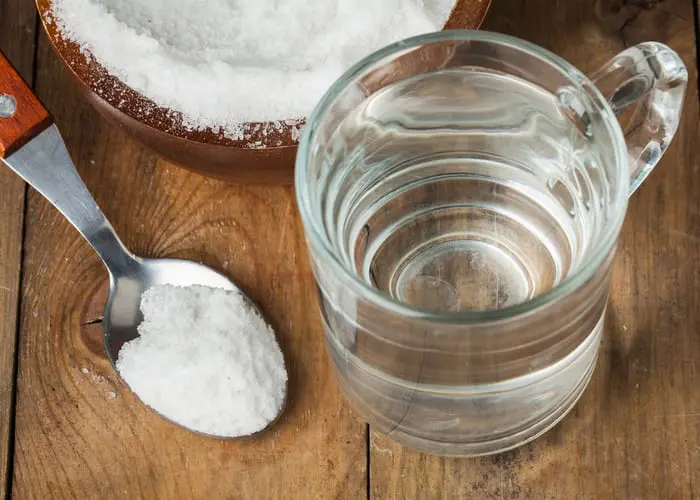
Alexeysun/Shutterstock
Salt dissolved in water is a good solution for weeds that grow in cracks in the sidewalk or driveway.
- Heavy-duty spray bottle
- Funnel
- Three parts salt
- 1 part warm water
Place the funnel into the spray bottle opening, then add your salt and water in measured amounts. For example, you might add 3/4 cup salt and 1/4 cup warm water to make your saline mixture. Warm water dissolves salt faster.
Remove the funnel, shake the bottle well, and spray it on the weeds you want to kill. Don’t use salt for weeds growing in flower beds or your lawn. It’s a non-selective herbicide, so it will kill anything that grows, not just weeds.
The salt will be absorbed into the soil, so do not use this mixture anywhere you plan to replant. It can prevent growth for months or even years, so be careful where you use it.
4. Salt, Vinegar, and Dish Soap
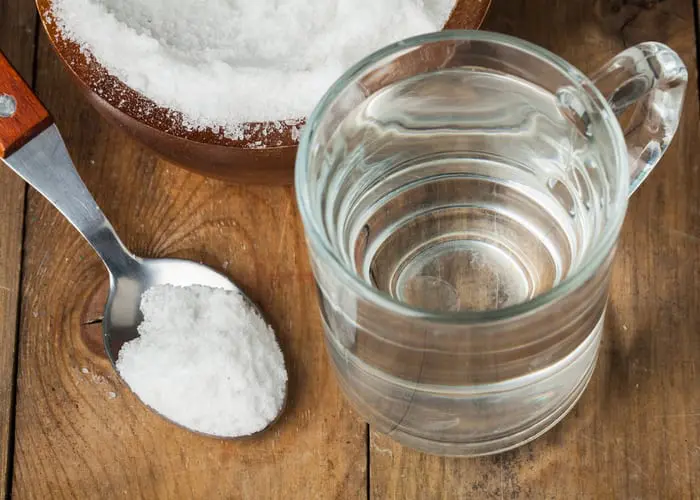
Studio Grand Web/Shutterstock
Salt, vinegar, and dish soap makes a powerful weed killer you can mix up in a minute or less! Make sure to use a vinegar with a minimum of 5% acetic acid. Ten percent is preferable.
The acetic acid percentage is the amount of actual vinegar in the liquid. So if you choose a variety with 5%, like Heinz distilled white vinegar, 95% of it is water.
- Heavy-duty spray bottle or weed sprayer
- Funnel
- 2 cups vinegar
- One teaspoon salt
- One teaspoon dish soap
Put the funnel in the spray bottle so you can easily add the ingredients. If you’re using a larger weed sprayer with a hose, you’ll want to increase the amounts of all ingredients for the size of your container.
Add the vinegar first, then the salt and dish soap. Remove the funnel and close the spray bottle. Shake the mixture vigorously to help the salt dissolve and mix the dish soap in. Spray this mixture directly onto weeds you want to kill.
Warning: Avoid spraying near grass or plants you don’t want to harm. This is a non-selective weed killer, so it will kill any plant it touches (not just weeds).
5. Borax, Vinegar, and Dish Soap
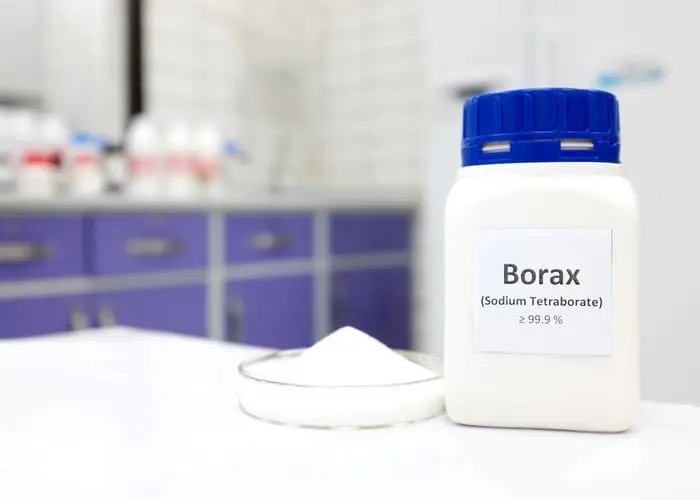
JK Sulit/Shutterstock
This homemade weed killer works just like the salt, vinegar, and dish soap mixture. Subbing in Borax for the salt will make the mixture more potent.
- Heavy-duty spray bottle
- Funnel
- 1 gallon vinegar (5%, 10%, or 20% acetic acid)
- 1 cup Borax
- One tablespoon dish soap
Use a funnel to add all ingredients to a spray bottle. Shake the mixture around after sealing the bottle, then spray directly onto weeds. This mixture will kill all plants, not just weeds, so don’t spray it all over your lawn or garden.
6. Corn Gluten Meal
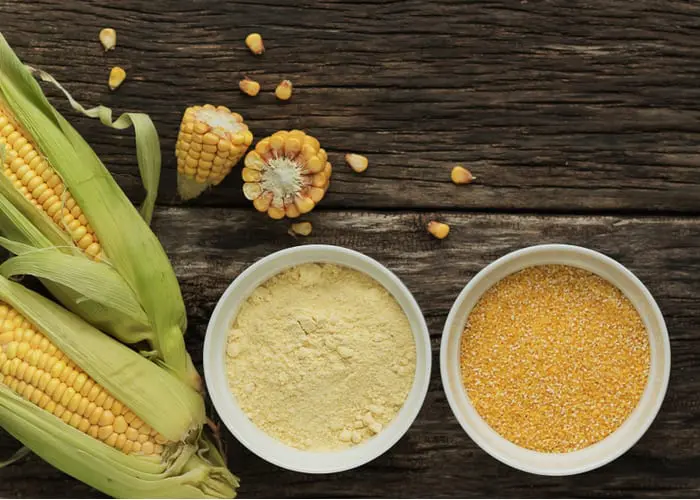
Tatiana Romanova-Sargaeva/Shutterstock
Corn gluten meal (a byproduct of the process of milling corn) does not kill existing weeds, but it will prevent new weeds from popping up in your lawn or garden.
First, use one of the other methods on this list to remove all the weeds in the area. Then, apply corn gluten meal to the lawn or garden area.
It will prevent small roots from forming in weeds like dandelions, crabgrass, lamb’s quarters, great plantain, and pigweed.
The great thing about using corn gluten meal is that it won’t hurt your established grass or plants at all. It only targets new feeder roots, which weeds need to survive and proliferate.
7. Cardboard or Newspaper

Billion Photos/Shutterstock
You can use cardboard or newspaper to smother weeds to death and deprive them of much-needed sunlight. This method isn’t always 100% effective, and it only works for flower beds or tilled garden areas, so keep this in mind.
You’ll need several sheets of newspaper or thick, corrugated cardboard. Because you want to prevent the covered weeds from getting any sunlight, these layers need to be thick.
Stack at least four sheets of newspaper on top of areas you’re covering, or use two sheets of cardboard. For the mulch, you can use any type. Dead leaves, wood mulch, or any type you have on hand will work.
It’s an essential part of making this method work, so don’t forget to spread the mulch on top of the newspaper or cardboard!
- Garden hose
- Newspaper or cardboard sheets
- Mulch
Lay and stack the covering down over the weedy areas. Spray the newspaper or cardboard with water until it is thoroughly soaked. Cover with mulch. This should keep flower beds sufficiently weed-free for the growing season.
More Natural Weed-Killing Tips and Tricks
The homemade weed killers above are a great start, but maintenance is key. Keep your lawn and garden weed-free with these tips and tricks.
- Apply weed-killing solutions on a dry, hot day to encourage the weeds to readily take in the mixture. You should see them wilt and shrivel within a few hours.
- Add lemon juice to any solution containing vinegar. This will boost the acidity and make the weed killer more potent.
- Reapply homemade mixtures every two weeks to keep weeds under control. Pull any young sprouts you see forming to make this even more effective.
- Use boiling water in any of the mixtures that call for water. The high temperatures speed things up and kill weeds faster.
- Cover any ornamental plants or grasses you don’t want to be affected by homemade solutions. Even small amounts of sprays or a sudden breeze can adversely affect your other plants.
- You can use other types of salt, like Epsom salt.
- Substitute apple cider vinegar for the white vinegar to get a slightly different scent and acidity.
- Try upgrading to horticultural vinegar for stubborn or dense weeds. Horticultural vinegar is especially effective because it’s 20% acetic acid making it four times stronger than kitchen vinegar. Be cautious when using it; wear a face mask and goggles for safety.
- Add orange oil instead of dish soap for a better scent and increased efficiency.
- Vegetable oil can be effective in place of dish soap.
- Green tea can be an effective weed killer.
You may also want to apply corn gluten meal after weeding to prevent germination of new weeds. Be careful not to spread it near plants you want because it will impact their growth as well.
Frequently Asked Questions
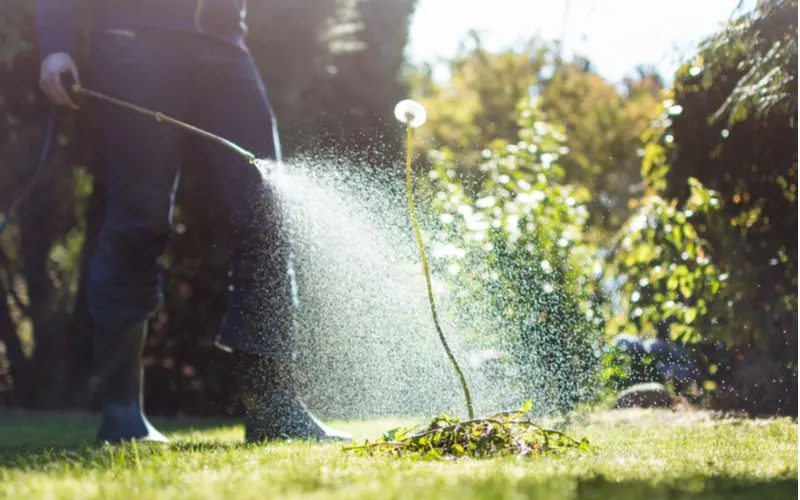
FrankHH/Shutterstock
In case you have some burning questions before starting, these FAQs may shed some light on things.
Do Homemade Weed Killers Work?
Homemade weed killers are safe and effective to use. They won’t harm people, pets, or the environment after application, and you should notice results in hours.
There are some drawbacks to using homemade weed killers. You have to be careful during application to avoid killing plants you want because vinegar-based weed killers kill everything they touch. You also need to reapply to kill large weeds and perennials.
What is the Strongest Homemade Weed Killer?
It depends on what you hope to accomplish. If you want to use a green, non-toxic mix that’s highly effective, the above homemade weed killer works well. You could also try borax and water, but it can destroy healthy plants and grass as well.
Does Vinegar, Epsom Salt, and Dawn Dish Soap Kill Weeds?
Yes, it’s a reasonably effective mixture. However, using this exact blend may require more reapplications because Epsom salt isn’t as efficient as table salt.
Can Baking Soda Kill Weeds?
Baking soda is toxic to plants, including weeds. Mix it with water and spray it on the weeds until they dry up and die. Unfortunately, this process could require multiple applications to work.
Another approach to using baking soda for weed control is sprinkling on the soil instead of the plants. This method protects your plants but neutralizes the soil to prevent new growth.
Is Horticultural Vinegar Safe to Use?
Horticultural vinegar is stronger than household vinegar, but it is safe to use with proper precautions. You should wear protective gloves, goggles, clothing, and a face mask because anything over 11% acetic acid can cause burns and eye irritation. The other concern about using horticultural vinegar is the cost. It may not save you enough money to make the mixture worthwhile.
Does Boiling Water Kill Weeds?
Boiling water can do some damage, but adding a little liquid dish soap can make it more effective against weeds. Be cautious when working with boiling water because the splashback can burn you.
Are You Ready to Make a Homemade Weed Killer?
Making homemade weed killer is an easy, cost-effective way to eradicate weeds on your property.
While it requires reapplication, it’s generally effective and can target difficult-to-reach areas, including sidewalk cracks.

